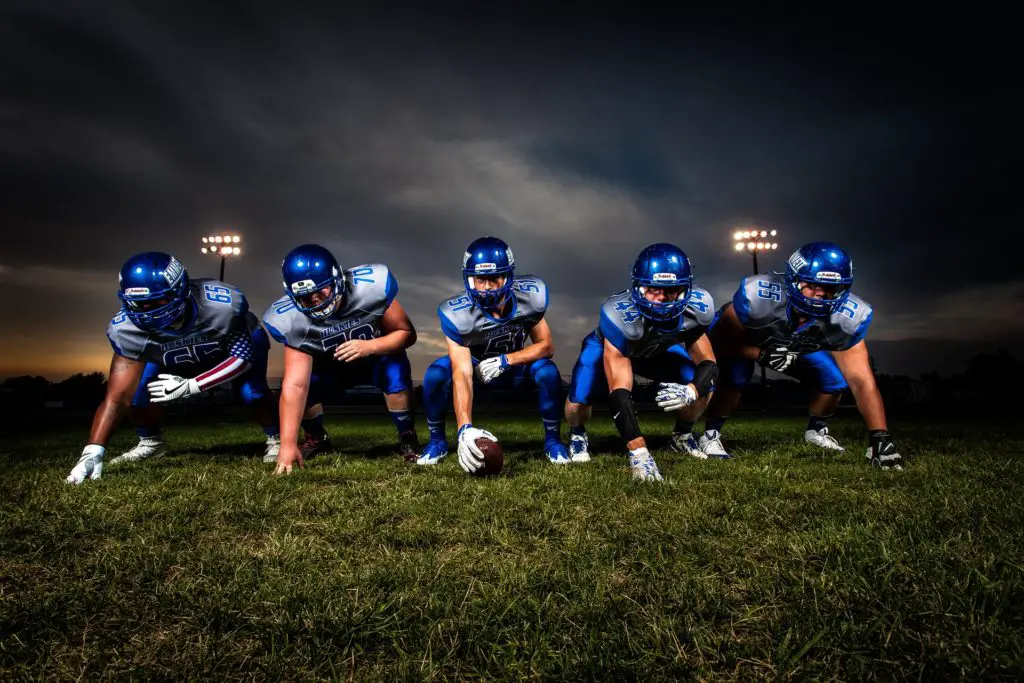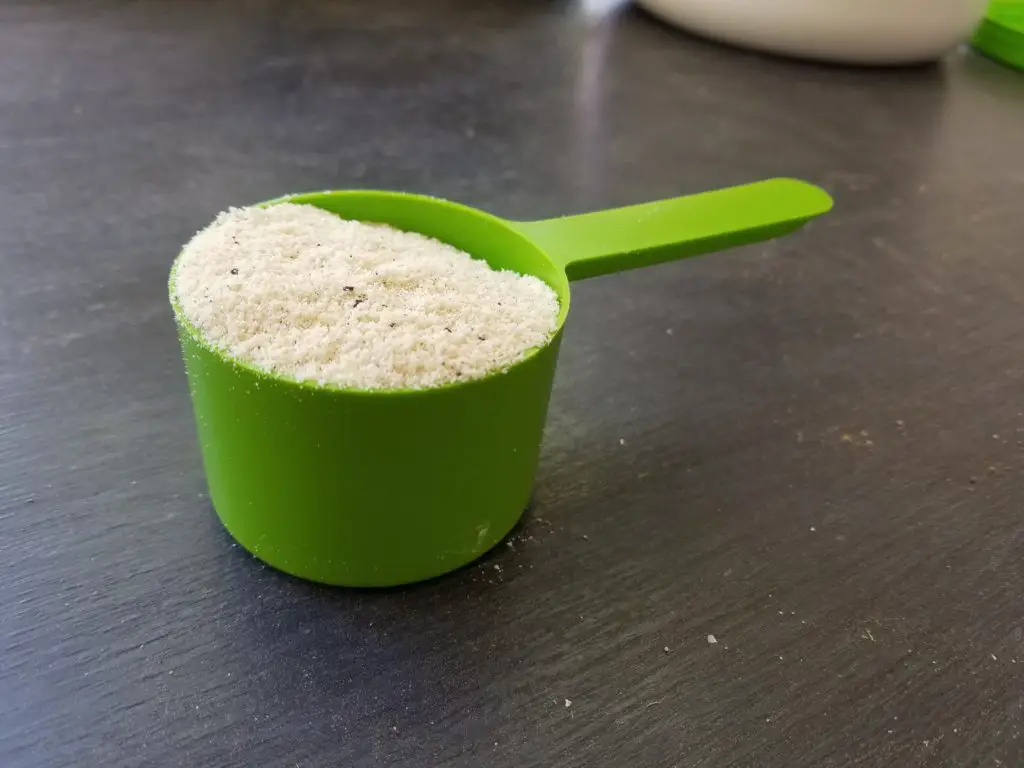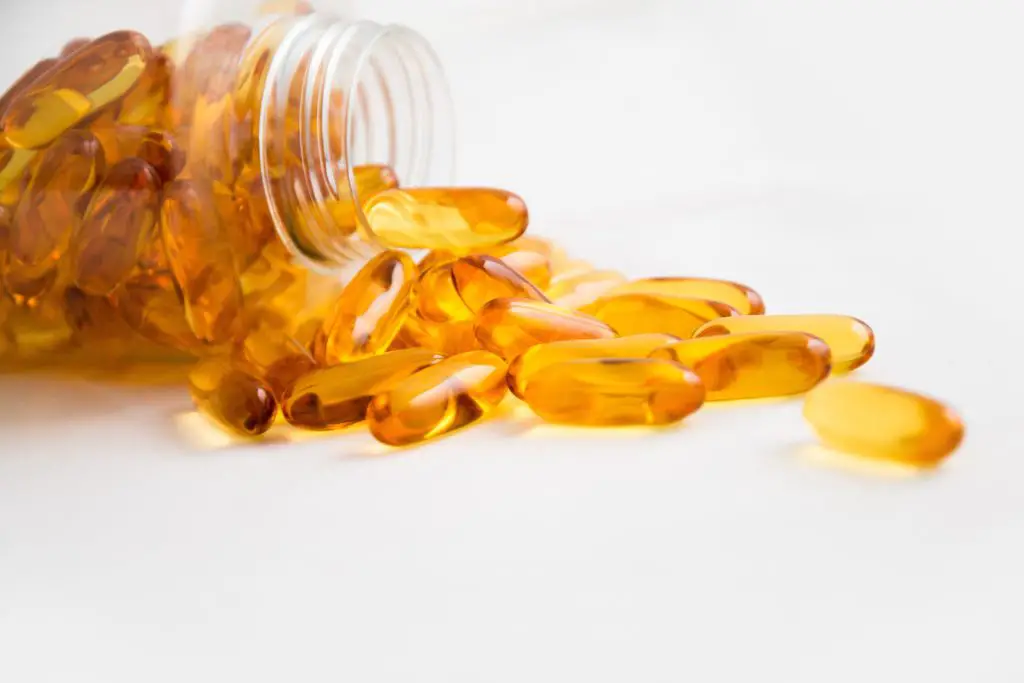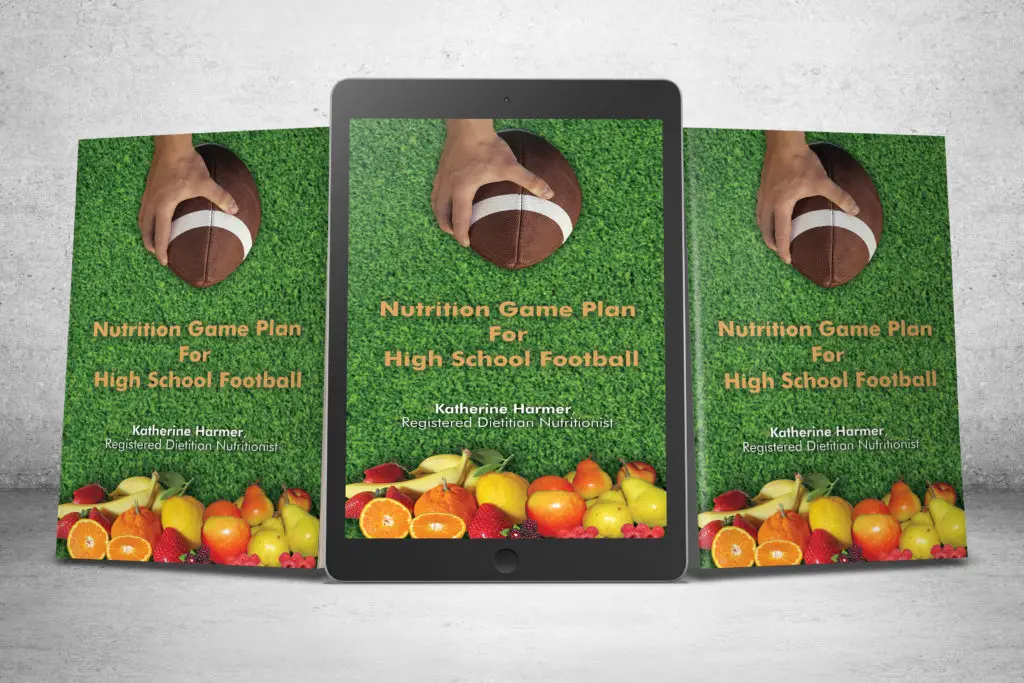Performance enhancing supplements are popular and so tempting with promises to increase strength, boost power, improve endurance, and speed up recovery. Even among high school athletes, supplements are becoming a normal part of athletic competition.
Most workout supplements are not recommended for adolescent athletes. A well planned, high-quality diet along with proper training is better than supplements. However,high-quality protein powders, vitamin D, and other vitamin and mineral supplements may be recommended and appropriate for some individuals with the guidance of an experienced athletic trainer and medical professional.
Keep reading for a list of the most common workout supplements for football athletes. Learn which ones are unsafe for adolescents, which ones are beneficial, and which ones are a waste of money.

Looking for more specific help and tips for your football season? I’ve got you covered!
Check out my new ebook- Nutrition Game Plan for High School Football. Includes a 4-week meal plan, sample meal schedule, pre- and post- workout snack list, and much much more in 40 pages of helpful tips. Take your game to the next level this season and get started today! Check it out here.
Supplements You Need to be Taking for High School Football
Ever walked through the GNC store and looked at the wide variety of workout supplements, wondering which ones you could be taking to help you be a better athlete? Many of those supplements are formulated for adults, and are not necessarily safe or beneficial for teenagers. The good news is that as teenagers you are still growing, developing, and building body and muscle tissue so you shouldn’t need any supplements. You’ll notice more athletic improvement from normal growth spurts than the small increase a workout supplement might provide. If you ever truly hit a plateau, then you might consider a change in your diet and training plan first, and then perhaps a supplement.
As a dietitian, I don’t normally recommend supplements for teenagers due to safety and health reasons during your years of growth and development, and lack of research in adolescents. If you think you may benefit from a supplement, consult with your doctor or dietitian and educate yourself on proper use, dosage, and any risks of supplements you may take.
Even though most may not be recommended, I am a fan of a few supplements that may be beneficial for growing, athletic teenagers. There is no “one-size-fits-all” approach to taking supplements. These recommendations are general, and you should still check with a health professional before taking any supplements or making a change to your diet.
Supplements that may be beneficial for a high school football player include protein, vitamin D, and multivitamins:
Protein Powder–
Protein powders can be expensive and aren’t necessary, but they can have a place in your diet with a proper plan. Protein is essential for a growing athlete, but it’s not always realistic to eat protein foods before or during a workout (such as meat, eggs, beans, dairy). If you find it difficult to consume protein foods at every meal and snack regularly throughout the day, a protein powder or protein bar might be helpful. When using protein powders or bars, a dose should contain about 15-30 grams of protein, and not more than that.
If you are going to consume protein supplements, be educated on what you are putting into your body. Protein powders often contain extra, unnecessary ingredients such as added sugar, artificial sweetener, thickeners, flavors, colors, and other ingredients. Try to choose a high-quality protein powder with simple ingredients and little or no sugar. Most protein powders are made for ages 18 plus, so be careful when choosing a brand. Orgain is a brand made for children and teens, but it’s also flavored and has a lot of other ingredients. Naked Whey is a great option that only contains whey and is Informed Choice tested (see below), but it isn’t tested in teenagers under 18.
Check out my post: Is Whey Protein Safe for Teenage Athletes? for more information on protein supplements for teenagers.

Vitamin D–
Vitamin D is important for bone health and strength, muscle growth, immune health, heart and lung function, recovery from injuries, and more functions which influence athletic performance. Vitamin D supplementation could benefit athletes by affecting muscle strength, injury rates, and immune health. Recent studies suggest that many athletes are deficient in vitamin D, meaning a supplement may be necessary for most individuals, especially during the winter months. Vitamin D comes from sun exposure as well as fatty fish, mushrooms, and some fortified foods. You can’t always count on sun exposure to get you all the vitamin D you need. Even among NFL players, 26% were deficient in vitamin D, and 42-80% were insufficient. Vitamin D supplement doses are controversial, especially among athletes. Appropriate amounts vary based on individual, climate, training amount, etc. The RDA (Recommended Dietary Allowance) is set at 600 IU per day for teens, but that may not be enough for teenage athletes. A supplement of 400-600 IU per day is usually sufficient. (Be aware that too much vitamin D can be harmful for your body). Vegan, vegetarian, lactose intolerant athletes, and those with limited sun exposure may need a supplement, as well as other athletes interested in improving their health. Check with your doctor if you believe you may benefit from a supplement.
Multivitamins–
Remember- food first! Food is better than supplements for overall health. Most teenagers do not need vitamins or supplements if they are regularly eating a wide variety of foods. There is no perfect “one-size-fits-all” vitamin for teenagers, however, it would be a good idea to check in with a doctor or dietitian annually for specific individual nutrient recommendations (completing food frequency questionnaires and blood tests). A multivitamin from a reputable brand may be beneficial for young athletes, just remember that food is almost always better than supplements and a supplement doesn’t make up for a bad diet.
Other important nutrients for football athletes include iron, calcium, vitamin C, and more. Check your supplement for each nutrient amount. An appropriate multivitamin has 100% Daily Value or less for each nutrient.
What Supplements Do NFL Players Take?
NFL athletes get to work with experienced trainers, coaches, dietitian nutritionists, and doctors to tailor their nutrition and training plan perfectly to their goals. They plan their diets so that most of their nutrients come from food. Extra nutrients may be needed to “supplement” their diet and help with training and recovery.
Some of the most common workout supplements taken by NFL athletes are protein, BCAAs, caffeine, fish oil, and vitamin D and vitamin C. Other supplements such as creatine may not be as beneficial in elite athletes.
The NFL has a large list of banned substances and performance enhancing drugs, so NFL athletes have to be careful about what and how much they take of each supplement. However, just because something is legal doesn’t necessarily make it beneficial or safe. And just because NFL athletes are taking specific supplements doesn’t mean you should. Their training, nutrition plan, size and weight, and daily life are much different than yours. If you want to be like them you better be training and practicing hard (and hoping for good genes as you grow).
Other Popular Supplements for Football Athletes:
I’ve put together this helpful table with details on the most common supplements for teenagers. This will help you get an idea of what each supplement is, the intended effects of taking it, any risks/side effects, and overall tips for teenagers interested in taking a specific supplement. This table includes a quick summary.
Popular Supplements for Teenage Athletes:
| Supplement | What it is | Effects | Risks | Tips |
|---|---|---|---|---|
| Protein Powder | Usually whey, soy, or casein in powder form. | Promotes muscle growth and post-exercise recovery. | Nausea, diarrhea, bloating and upset stomach. Harmful in large doses. | Consume high-quality protein foods instead. |
| Creatine | Comes from protein-rich foods, also made in the body. | Improves strength and power. | May cause gut problems, dehydration, cramps, nausea, and some weight gain. | May not be safe for growing adolescents. Eat a balanced diet to get creatine from food instead. |
| Caffeine | Natural stimulant that comes from a plant or produced artificially. | Reduces fatigue and improves power and endurance. | High doses cause trembling, heavy sweating, dizziness, vomiting, increased heart rate, and anxiety. Toxic in large doses. | Possible benefits may not outweigh the consequences. |
| BCAAs | Specific amino acids that naturally occur in protein foods. | Muscle growth, fat loss, delays fatigue, and boosts immune system health. | Conflicting research on effectiveness of BCAAs supplements. | Not recommended for teens. It’s better to eat a variety of high-quality protein foods. |
| Sodium Bicarbonate | Baking soda | Improves performance and reduces fatigue during high intensity events. | May cause gut problems | Possible benefits may not outweigh the consequences. |
| Nitrate | Molecule from vegetables and produced in the body. Commonly consumed as beetroot or spinach supplement | Improves exercise tolerance and performance in endurance exercise | May cause gut discomfort and discoloration of urine. May not be effective in elite athletes. | Not typically recommended for teenagers. |
| Collagen | Body protein for structure and support. | May support strong bones and joints for exercise and speed up recovery time for injuries. | Could cause allergic reactions for some individuals, gut discomfort, and heartburn. | Choose food sources high in collagen like meat, fish, bone broth, eggs instead of a supplement. |
| HMB | Chemical produced by our bodies and found in foods. | To increase muscle size/strength and improve recovery. | Research is insufficient | Limited data on safety and effectiveness. Use with caution. |
| Pre-Workout | Mixture of multiple supplements | Increase endurance, energy, strength, and focus. | May contain unsafe substances and unclear dosage | Know exactly what is in supplements you take. |
| Probiotics | Good bacteria that promotes good gut health. | Improves digestion, general health, athletic performance, recovery time, and energy. | Gut problems- gas, bloating, cramps, diarrhea. | Eat a variety of probiotic foods. Consume a probiotic with multiple bacteria strains of 25-35 billion CFUs. |
| Fish Oil | Oil from fatty fish. Contains omega-3 fatty acids for heart health. | Helps decrease inflammation. | Unpleasant aftertaste, heartburn, indigestion, diarrhea. | Consuming fish will help with omega-3s and also provide protein. |
Check out my post: Best Supplements for Teenage Athletes for more detailed information about each of the above supplements.
Supplements Football Players Should Avoid
There is a long list of banned substances that are unsafe or contribute to unfair advantages. You can check the NFL 2020 List of Banned Substances here. Other supplements you should avoid include mixtures of supplements such as “Pre-Workout” and other blends. Some unsafe ingredients may not be listed on the label. Buy any supplements from a reputable company that is third-party tested and contains only the ingredients you need.

How to Choose a High Quality Supplement
Dietary supplements are not heavily regulated by the FDA. Companies are not required to prove that a supplement works or even contains the stated ingredients. The FDA only restricts or removes supplements that have been on the market for some time and have been shown to be unsafe or misleading.
Some third party organizations test supplements to verify ingredients. Look for their labels on supplement containers, examples include NSF International, US Pharmacopeia, or Informed Choice. You can even use the NSF App to search for certified products.
A registered dietitian who specializes in sports nutrition can also help with choosing an appropriate brand and type of supplement for your individual needs and goals.
You can also find information about dietary supplements from trusted online sources such as the National Institute of Health and their Dietary Supplement Fact Sheet.
Most supplements are intended for healthy adults and could be harmful for a teenager still in their critical years of growth and development. Most high school athletes do not require supplements, they will likely not improve your skills as much as regular training for your sport and a healthy diet. If you do decide to take a supplement, with your doctor/trainer/dietitian’s approval, read the ingredients and look for supplements that are third party tested.
Where to Buy Workout Supplements
Some supplements contain unsafe ingredients, some supplements contain unsafe dosages, and some supplements are a waste of money.
Supplements can also be expensive, especially if you are buying them at specialty stores such as GNC or a health store. You can get many types of affordable supplements online from stores such as Amazon, or even in your local grocery stores.
If you are going to buy supplements, carefully read the labels and ingredients and check first with your health care professional.
Summary/Overall Tips
Supplements may give you a boost, but remember “food first!” Supplements should not be used in place of a healthy diet. And never forget proper training and recovery efforts for hydration, fueling, and sleeping. Any supplements will not be beneficial unless you are already doing your best to take care of your body and training hard.
Supplements are not a one-size-fits all approach. Every individual requires a different diet and different supplement recommendations, if any. Your supplement “stack” will never be the same as your friends and teammates.
Be careful, there have been many athletes and body builders who take shady supplements and end up in the hospital or dead because of harmful ingredients or doses. Know exactly what you are taking, what it does, dosage, risks, and have the guidance of a medical professional.
Overall, I am hesitant to recommend supplements for most teenagers as the safety, efficacy, and benefits are often unknown in adolescent athletes.
Most supplements would likely only bring small athletic improvements, and the possible health risks do not outweigh the benefits in adolescents. Teenagers are under intense pressure in their sport, and may try to gain any type of competitive advantage from supplements. Winning is not more important than good health. A high school athlete’s efforts and money are better spent focusing on diet, exercise, and appropriate training to achieve athletic goals.
Related Questions
Is Creatine Good for Football Players? Creatine comes from food and is also produced in our muscles for energy production during sports. Creatine may improve athletic performance during high intensity events for some individuals, but results vary with individual training levels and athletic events. Some football players may benefit from creatine. Overall it isn’t a good idea for teenage athletes to use creatine, but once you have finished growing and are 18 or older, it may be appropriate.
What Supplements are Legal for High School Athletes? Check with local regulations, but typically all the above discussed dietary supplements are allowed in high school sports in safe doses (caffeine is not allowed in high amounts). Just because a supplement is allowed, doesn’t necessarily mean it is safe or effective.
Can Probiotics Help Build Muscle? More research is needed, but probiotics do not necessarily seem to help most athletes build muscle. Probiotics can help improve an athlete’s gut health, which improves many other aspects of overall health including athletic performance, recovery time, and energy.
See Also
- FREE Meal Plan for High School Football Athletes
- Is Creatine Safe for High School Athletes?
- Best Supplements for Teenage Athletes
- Best Meal Plan for Teenage Athletes
- The Worst Foods to Eat Before Football
References
- de la Puente Yagüe, M., Collado Yurrita, L., Ciudad Cabañas, M. J., & Cuadrado Cenzual, M. A. (2020). Role of Vitamin D in Athletes and Their Performance: Current Concepts and New Trends. Nutrients, 12(2), 579. https://doi.org/10.3390/nu12020579
- Nutrition and Athletic Performance — Joint Position of the Academy of Nutrition and Dietetics, Dietitians of Canada and American College of Sports Medicine (March 2016).
- Supplements and Ergogenic Aids. Academy of Nutrition and Dietetics eatright.org. Written by Esther Ellis, MS, RDN, LDN. (October 2018)
Written by Katherine Harmer, Registered Dietitian Nutritionist
Fueling Teens is a participant in the Amazon Services LLC Associates Program, an affiliate advertising program designed to provide a means for sites to earn advertising fees by advertising and linking to Amazon.com. We also participate in other affiliate programs which compensate us for referring traffic.


